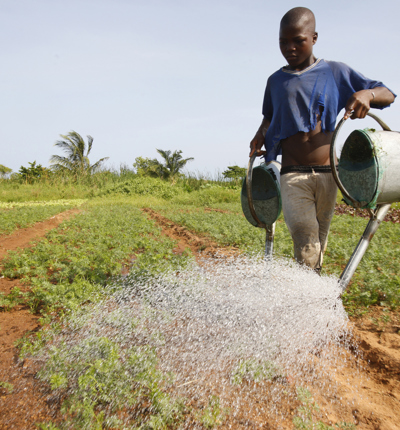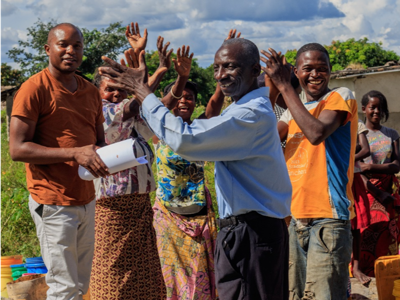
The mental health impact of child labour in supply chains
Following World Mental Health Day, marked by the World Health Organisation on every 10 October, Malik Gray and Rachel Bonner discuss the need for more recognition and awareness of the mental health ramifications of child labour in supply chains.
Posted on 22 October 2021
The World Federation for Mental Health set this year’s World Mental Health Day theme as Mental Health in an Unequal World, reasoning that “the world is increasingly polarized, with the very wealthy becoming wealthier, and the number of people living in poverty still far too high.”
Poverty, combined with a lack of respect for human rights in many countries, is associated with the exploitation of child labour in supply chains. As set out further below, supply chains that use child labour can have serious impacts on the mental health of those who are exploited under those systems, a point that is often ignored but merits more recognition and action.
What is the connection between child labour and mental health?
Time and time again, multinational companies exploit the rights of individuals, particularly children, in complete ignorance of, or lack of respect for, the impact on their mental health. Many claims, such as the lawsuit brought in the US, in which Mars, Nestlé, and Hershey faced allegations of child slavery, and reports, such as those of child labour taking place at mica mines in India and Madagascar, outline the negative effects on the victims’ health.
Consideration of child labour usually focuses on the impact on physical health. There have been many studies into the physical impact of child labour, some resulting in specific legislation since the industrial revolution in 1802. Some studies have reported that child labour is associated with higher prevalence of mental and/or behavioural disorders, but this aspect of child labour is often overlooked.
The Journal of Public Health published an article in 2019 which summarises current evidence and studies on the impact of child labour on mental health. Their findings indicate a need for more awareness, and the need to redouble current efforts against child labour.
The 2019 article set out data from a study in Jordan that reported that working children (both those in and out of school) exhibited lower levels of coping efficacy and psychosocial health than non-working children.
In addition, a study conducted in Pakistan reported higher levels of behavioural problems among working children, including problems with peers and conduct problems. These studies show concrete and significant mental health impacts on working children, but still represent only a small sample of the gradual and life-long mental effects of child labour.
What further action should be taken to raise awareness and solve this issue?
Particularly after a child labourer is either rescued or no longer involved in forced labour, serious rehabilitation is needed to ensure these children receive the care they need to move towards recovery and rebuild their future.
One of the few organisations focusing on finding out exactly what mental health issues are faced by rescued adolescents is Salaam Baalak Trust (SBT), a non-profit organisation operating in Delhi and Mumbai which has a dedicated Mental Health Programme.
Dr Mazhar Khan, one of the consultant psychologists who is part of the Mental Health Programme, released an exclusive report to The News Minute listing disturbances in mental health like sleeping problems and excessive fear, accompanied by numerous psychiatric disorders like Bipolar disorder, clinical depression, psychosomatic disorders and even seizures. “Psychological effects of child labour are as severe as its physical ones,” Dr Mazhar writes, and he says that it is unfortunate that most of the time, our focus is only on children’s physical health.
It is interesting to consider that even the law itself seems to ignore these clear mental ramifications resulting from child labour. In India for example, the Child and Adolescent Labour (Prohibition & Prevention) Act 1986 was furthered in June 2016 with some changes which do reinforce the prevention of child labour in general, but do not see it from the perspective of mental health. “Mental health is one of the most screaming reasons why child labour and related practices need to be abolished by roots,” says Varsha, who holds an advisory position in the state government in India.
What efforts are being made?
The United Nations had the goal to eliminate child labour by 2050, and since 2000, child labour rates have decreased by 94 million. Therefore, there have been some positive improvements. Greater accountability and robust legislation holding companies liable for harm occurring in their supply chains is urgently needed.
Until this happens, legal cases will continue to be an important means to hold companies to account where enough is not done to protect those working in their supply chains, such as the case against British American Tobacco and Imperial in which Leigh Day is representing victims of child and forced labour.
Lawyers should be aware of the potential mental health impacts on child labourers, and ensure that treatment is available to those who have been impacted if required. The sooner the protections are in place and companies take responsibility for the wellbeing and fair treatment of those in their supply chains, the sooner we will see the eradication of child labour, and the reduction of mental health difficulties in children subjected to forced labour.
The World Federation for Mental Health outlines that we are ‘in the midst of another global crisis’.
This is resulting in widening health, economic and social inequalities. The 2021 World Mental Health Day campaign provides an opportunity for people to come together and act together to highlight and bring awareness to how inequalities, such as the practice of child labour, can be addressed to ensure people are able to enjoy good mental health, no matter their circumstances.




